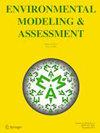利用Copula模型对奶牛场饲料产量的生产效率和温室气体目标进行建模
IF 2.6
4区 环境科学与生态学
Q3 ENVIRONMENTAL SCIENCES
引用次数: 1
摘要
本文章由计算机程序翻译,如有差异,请以英文原文为准。
Modeling Production Efficiency and Greenhouse Gas Objectives as a Function of Forage Production of Dairy Farms Using Copula Models
求助全文
通过发布文献求助,成功后即可免费获取论文全文。
去求助
来源期刊

Environmental Modeling & Assessment
环境科学-环境科学
CiteScore
4.50
自引率
4.20%
发文量
54
审稿时长
18-36 weeks
期刊介绍:
Environmental Modeling & Assessment strives to achieve this by publishing high quality, peer-reviewed papers that may be regarded as either instances of best practice, or as studies that advance the evolution and applicability of the theories and techniques of modeling and assessment. Consequently, Environmental Modeling & Assessment will publish high quality papers on all aspects of environmental problems that contain a significant quantitative modeling or analytic component, interpreted broadly. In particular, we are interested both in detailed scientific models of specific environmental problems and in large scale models of the global environment.
We invite models of environmental problems and phenomena that utilise, in an original way, the techniques of ordinary and partial differential equations, simulation, statistics and applied probability, control theory, operations research, mathematical economics, and game theory.
Emphasis will be placed on the novelty of the model, the environmental relevance of the problem, and the generic applicability of the techniques used. Generally, papers should be written in a manner that is accessible to a wide interdisciplinary audience.
 求助内容:
求助内容: 应助结果提醒方式:
应助结果提醒方式:


